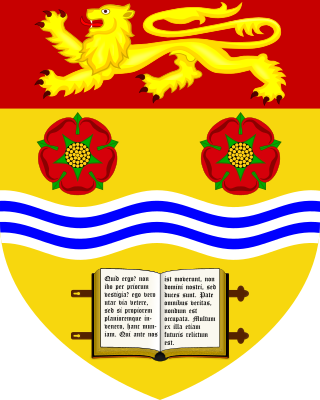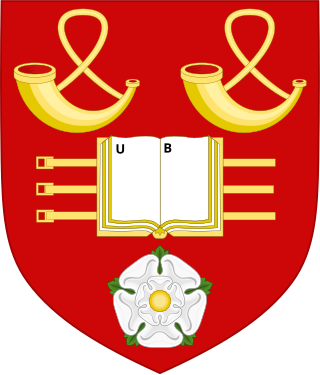
The University for Peace (UPEACE) is an international graduate-only university and intergovernmental organization. The university was established as a treaty organisation by the United Nations General Assembly in 1980.

Lancaster University is a public research university in Lancaster, Lancashire, England. The university was established in 1964 by royal charter, as one of several new universities created in the 1960s.

The University of Essex is a public research university in Essex, England. Established by royal charter in 1965, it is one of the original plate glass universities. The university shield consists of the ancient arms attributed to the Kingdom of Essex, and the motto, "Thought the harder, heart the keener", is adapted from the Anglo-Saxon poem The Battle of Maldon. It comprises three campuses in the county, in Southend-on-Sea and Loughton with its primary campus in Wivenhoe Park.

The University of Bradford is a public research university located in the city of Bradford, West Yorkshire, England. A plate glass university, it received its royal charter in 1966, making it the 40th university to be created in Britain, but can trace its origins back to the establishment of the industrial West Yorkshire town's Mechanics Institute in 1832.

The Institute for Fiscal Studies (IFS) is an economic research institute based in London, United Kingdom, which specialises in UK taxation and public policy. It produces both academic and policy-related findings.

The Isaac Newton Institute for Mathematical Sciences is an international research institute for mathematics and its many applications at the University of Cambridge. It is named after one of the university's most illustrious figures, the mathematician and natural philosopher Sir Isaac Newton and occupies one of the buildings in the Cambridge Centre for Mathematical Sciences.

The Johannes Gutenberg University Mainz is a public research university in Mainz, Rhineland Palatinate, Germany, named after the printer Johannes Gutenberg since 1946. With approximately 32,000 students (2018) in about 100 schools and clinics, it is among the largest universities in Germany. Starting on 1 January 2005 the university was reorganized into 11 faculties of study.

Stockholm International Peace Research Institute (SIPRI) is an international institute based in Stockholm. It was founded in 1966 and provides data, analysis and recommendations for armed conflict, military expenditure and arms trade as well as disarmament and arms control. The research is based on open sources and is directed to decision-makers, researchers, media and the interested public.
Jewish studies is an academic discipline centered on the study of Jews and Judaism. Jewish studies is interdisciplinary and combines aspects of history, Middle Eastern studies, Asian studies, Oriental studies, religious studies, archeology, sociology, languages, political science, area studies, women's studies, and ethnic studies. Jewish studies as a distinct field is mainly present at colleges and universities in North America.

Peace and conflict studies or conflict analysis and resolution is a social science field that identifies and analyzes violent and nonviolent behaviors as well as the structural mechanisms attending conflicts, with a view towards understanding those processes which lead to a more desirable human condition. A variation on this, peace studies (irenology), is an interdisciplinary effort aiming at the prevention, de-escalation, and solution of conflicts by peaceful means, thereby seeking "victory" for all parties involved in the conflict.

The University of Malta is a higher education institution in Malta. It offers undergraduate bachelor's degrees, postgraduate master's degrees and postgraduate doctorates. It is a member of the European University Association, the European Access Network, Association of Commonwealth Universities, the Utrecht Network, the Santander Network, the Compostela Group, the European Association for University Lifelong Learning (EUCEN) and the International Student Exchange Programme (ISEP).
Beverley Skeggs is a British sociologist, noted as one of the foremost feminist sociologists in the world. Currently, she works as a "Distinguished Professor" in the Sociology Department at Lancaster University, developing a Center for Social Inequalities in the North West of England. She continues to run the "Economics of Care" theme at the International Inequalities centre at the London School of Economics (LSE) and is a visiting professor at Goldsmiths University. She has been the head of two of the UK’s leading Sociology Departments, at the University of Manchester and Goldsmiths, as well as co-director of Lancaster's Women's Studies. In addition, she played a part in transforming Britain's oldest sociology journal, The Sociological Review, into an independent foundation devoted to opening up critical social science and supporting social scientists.
Elena Lieven is a British psychology and linguistics researcher and educator. She was a senior research scientist in the Department of Developmental and Comparative Psychology in Leipzig, Germany. She is also a professor in the School of Health Sciences at the University of Manchester where she is director of its Child Study Centre and leads the ESRC International Centre for Language and Communicative Development (LuCiD).

The Centre for International Education and Research (CIER) evolved in the 1950s, at the University of Birmingham UK, in the context of the involvement of British academics in the new international educational role of the United Nations.

The University of Cambridge Institute of Continuing Education (ICE) is a department of the University of Cambridge dedicated to providing continuing education programmes which allow students to obtain University of Cambridge qualifications at undergraduate and postgraduate level. Its award-bearing programmes range from undergraduate certificates through to part-time master's degrees. ICE is the oldest continuing education department in the United Kingdom.
Lancaster University is organised into four main faculties, each of which comprises multiple departments, institutes and centres.

The Lancaster Institute for the Contemporary Arts is an academic institution, art school, and arm of the University of Lancaster, that delivers research and teaching in fields of contemporary art and design; including in the subject areas of Fine Art, Theatre, Design, and Film studies. The institute also houses two research centres: Insight and Imagination. LICA has a close working relationship with the public arts organisation: Lancaster Arts.
Hilary Mavis Graham, is a British sociologist and social policy academic, who specialises in public health. Since 2005, she has been Professor of Health Sciences at the University of York. She previously lectured at the University of Bradford, the Open University, Coventry Polytechnic, the University of Warwick, and Lancaster University.
Robin Grove-White is an Anglo-Irish Welsh environmentalist, and academic, Emeritus Professor of Environment and Society at Lancaster University. Grove-White Chairs the board of the Institute for Study of Welsh Estates (ISWE) at Bangor University. He is also involved in local organisations such as Menter Mechell and Cymdeithas Hanes Mechell and is president of the Anglesey Antiquarian Society. In 2018 he was awarded an honorary fellowship for Services to the Community at Bangor University















